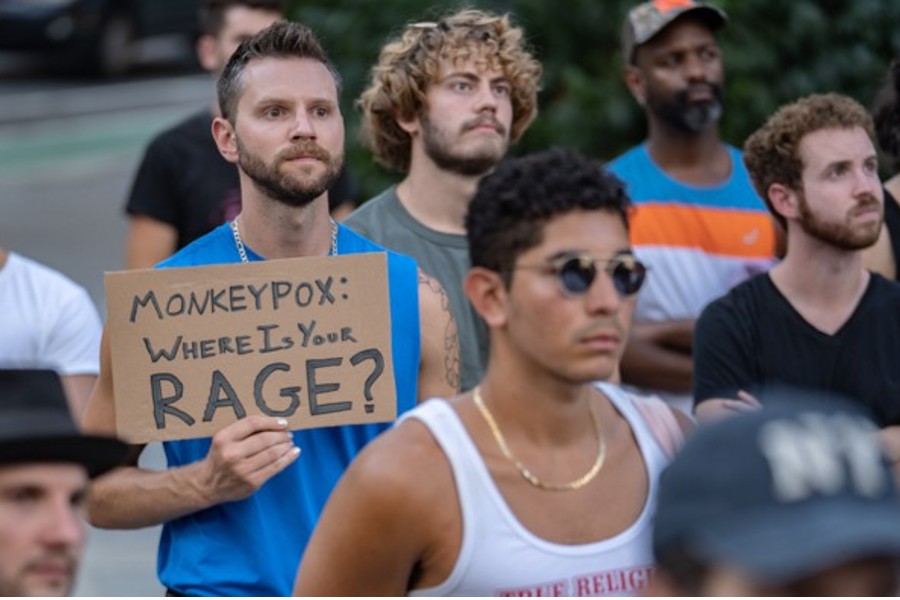
New York City today declared an end to the mpox outbreak as transmission has remained very low in the city for two consecutive months.
The declaration follows the successful vaccination of more than 100,000 New Yorkers, and community partnerships in education and behavior change. The city had been the epicenter of the outbreak but launched a number of successful response strategies. The declaration comes as the U.S. public health emergency expired on Jan. 31.
“The end of the mpox outbreak is a moment of pride for us in public health, and represents the best of science and society coming together for quick action,” said Health Commissioner Dr. Ashwin Vasan. “Our City vaccinated more than 100,000 people and was the first in the nation to pilot effective strategies, driving both public awareness and official response strategies. Combined with widespread and deep community partnerships, leadership from affected communities and advocates, and the steadfast engagement of providers and many others, we have dramatically reduced transmission, and are better prepared for future outbreaks. New York City took bold action early and throughout this outbreak, and together helped turn the tide and mobilize the nation.”
“When mpox began spreading in New York City, the City and its public hospital system mobilized its facilities and launched a mobile vaccination fleet to bring the vaccine to all New Yorkers without exception,” said Andrew B. Wallach, MD, FACP, Ambulatory Care Chief Medical Officer at NYC Health + Hospitals. “Our community vaccine hubs and mobile vaccine clinics have met people where they are, as they are, removing barriers to ensure those who identify as members of the LGBTQ+ communities receive the full protection of the vaccine and the culturally-responsive, gender-affirming care they deserve. We are proud to have played a critical role in the City’s successful mpox response and thankful to all the frontline healthcare workers, engagement teams and community partners who worked so tirelessly to keep their fellow New Yorkers safe.”
Over the course of the 2022 outbreak, more than 155,000 doses of the mpox vaccine were administered in New York City alone. The number of vaccines administered in New York City exceeded the amount administered in 49 U.S. states. Only California administered more (more than 289,000 doses) followed by New York City and then the state of Florida (around 92,000 doses).
In partnership with community, New York City consistently rolled out first-in-the-nation interventions. For example, New York City introduced a vaccination strategy that was followed nationally. In June 2022, using limited vaccine doses allocated to the City from the federal government, New York became the first jurisdiction to launch “extended PEP” vaccination clinics around Pride week – which opened vaccination to New Yorkers at risk of having had a recent exposure, rather than limiting to people who were a known contact of someone diagnosed with mpox. This innovative vaccine strategy opened a path for expanded vaccination access across the city and country. In addition, in response to concerns from partners, New York City was the first jurisdiction to call for an official change to the name monkeypox – and then eventually moved to unilaterally adopt a name change for the city even before the WHO’s decision to update the name to mpox.
The City worked to combat inequities in access to healthcare, homophobia, transphobia, racism in healthcare through a range of strategies that informed the federal government’s response to the outbreak. These include ZIP code reserved vaccination appointments for areas with a high percentage of other health and socioeconomic disparities through the city’s online platform and millions of dollars in funding to community groups who promoted and connected New Yorkers to vaccination, with a focus on reaching LGBTQ+ residents in communities that have a high percentage of health and other socioeconomic disparities. The contributions and engagement of the LGBTQ+ community were critical to the City’s response and its overall success and effectiveness. Between June and December, the mpox community engagement team participated in nearly 600 events. Dedicated outreach was carried out at bars, circuit parties, sex/play parties, and community health fairs and other events. Nearly 50,000 people were engaged with information about mpox, including prevention strategies and scheduling first and second doses.
In coordination with the Health Department, NYC Health + Hospitals mobilized public hospitals and mobile vaccination clinics to administer over 16,000 doses of the mpox vaccine at locations that prioritize access and equity for New Yorkers most at risk of mpox exposure. Established in consultation with LGBTQ+ community advocates and partners, the mobile program administered vaccinations at more than 70 unique sites, including pride and wellness centers, health clinics and youth and adult shelters. Community-guided mobile clinics established at LGBTQ+ centered events, including parties with close physical or sexual contact and high risk of mpox transmission, vaccinated as many as 40 to 60% of event attendees. These sites ensured mpox vaccines were available at trusted, accessible locations for New Yorkers most at risk of exposure and at sites that welcome sex workers and patients with HIV who may be discriminated against or stigmatized when seeking care.
The Health Department also released a final mpox data report on the 2022 outbreak. From May 19 through Dec. 31, 2022, there were 3,821 mpox cases in New York City, which fell from a peak of around 70 cases per day to a seven-day average of zero through much of January. The majority of cases were among people who identify as LGBQ+. Nearly thirty-five percent of cases were experienced by New Yorkers who identified as Hispanic/Latino, around 27 percent of cases in New Yorkers who identified as Black/African American and 22.4 percent self-identified as White; while 3.6 percent of cases occurred among Asian Americans and Pacific Island individuals, and 1.7 percent among those who self-identified as ‘another race.’
Although the outbreak is over, mpox transmission continues to occur at a low level in NYC. Providers should continue to test patients for mpox when they present with symptoms of the virus.
NYC Health + Hospitals continues to offer mpox vaccinations by appointment as well as testing and treatment at its 11 acute ambulatory clinics and five PRIDE Health Centers, co-located at Metropolitan, Bellevue, Lincoln, Woodhull, Jacobi hospitals, as well as the East New York, Gouverneur, Judson, and Vanderbilt Gotham Health facilities. To date, Health + Hospitals has administered approximately 11,000 first doses and 1,800-second doses of the mpox vaccine tested approximately 3,000 patients, and treated over 280 people in its outpatient, inpatient and emergency department facilities.
New Yorkers seeking care for suspected mpox should call their health care provider immediately. For those who do not have one, they can call 311 to get connected to an NYC Health + Hospitals location or to access NYC Health + Hospital’s Virtual ExpressCare. New Yorkers can also visit the NYC Health Map to find a nearby provider. Care is available in New York City regardless of immigration status, insurance coverage, or ability to pay.
People at risk of mpox can access vaccination through their providers or go to https://vaccinefinder.nyc.gov/. New Yorkers who received their first dose are strongly advised to get their second doses of the vaccine.
“GMHC was proud to partner with NYC to fight this outbreak,” said Kishani Moreno, Interim CEO and COO of GMHC. “Funding and support from the city helped us to navigate over 600 community members to vaccine appointments, host a NY Health + Hospitals mobile vaccine clinic at our midtown facility for three weeks, conduct street outreach in the Bronx, and leverage the power of social media to share stigma-free, culturally relevant public education. We look forward to continued partnership to ensure New Yorkers at risk for MPOX infection receive the full, two-dose vaccination and remain vigilant in protecting themselves and their communities.”
“Callen-Lorde celebrates the end of the MPOX outbreak and applauds the city’s innovative collaboration with LGBTQ+ community organizations that helped achieve this success, including all of those LGBTQ+ community members who advocated for themselves and took action on vaccine equity,” said Anthony Fortenberry, Chief Nursing Officer at Callen-Lorde Community Health Center. “It’s our hope that the community health infrastructure created to leverage resources targeted toward the LGBTQ+ community is sustained to ensure continued investment in affirming sexual/health care.”
Become a Harlem Insider!
By submitting this form, you are consenting to receive marketing emails from: . You can revoke your consent to receive emails at any time by using the SafeUnsubscribe® link, found at the bottom of every email. Emails are serviced by Constant Contact








